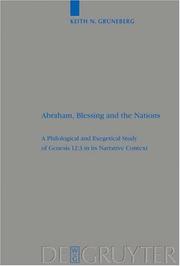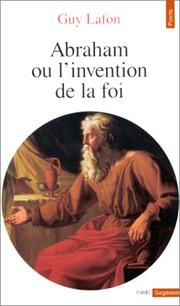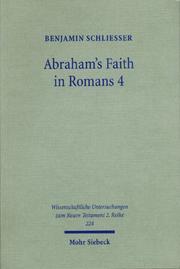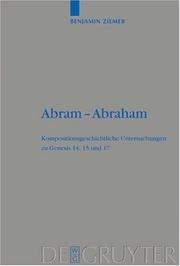| Listing 1 - 10 of 52 | << page >> |
Sort by
|

ISBN: 3110178370 3110895110 9783110895117 9783110178371 9783110178371 Year: 2003 Volume: 332 Publisher: Berlin de Gruyter
Abstract | Keywords | Export | Availability | Bookmark
 Loading...
Loading...Choose an application
- Reference Manager
- EndNote
- RefWorks (Direct export to RefWorks)
Die Studie untersucht Gen 12,3 im Kontext des Buches Genesis. Der Vers ist in erster Linie als Verheißung der Gewissheit und Größe für Abraham und Israel zu verstehen. Insbesondere angesichts seiner Platzierung nach Gen 1-11 weist er jedoch auch auf Gottes Plan hin, seinen Segen auf alle Völker der Erde auszudehnen. Die Arbeit untersucht die engsten Parallelen im Buch Genesis und in Num 24,9, die diese Interpretation bestätigen. Des Weiteren werden das Konzept des Segens im Alten Testament und die Semantik der Nifal- und Hitpael-Stämme des Verbs barak eingehend untersucht. This monograph investigates Genesis 12:3 in its context in the final form of Genesis. The author argues that the verse is, first, a promise of security and greatness to Abraham and Israel. However, its position following Genesis 1-11 also indicates a divine plan to extend blessing to all the peoples of the earth. Supporting this understanding of the verse, the author examines the close parallels that Genesis and Numbers 24:9 have to Genesis 12:3. He also presents a detailed consideration of the concept of blessing in the Old Testament and of the niphal and hithpael stems of the verb barak. Ph.D. dissertation under the supervision of Dr R. W. L. Moberly, Durham, UK.
Abraham --- Bible --- Criticism, interpretation, etc --- 222.2 --- Genesis --- Abraham, --- Abram --- Abramo --- Abū al-Anbiyāʼ Ibrāhīm al-Khalīl --- Abŭraham --- Avraam --- Avraham --- Avram --- Halil-ül-Rahman İbrahim --- Ibrāhīm al-Khalīl --- Ibrahim --- İbrahim, --- Khalīl Allāh --- Nabi Ibrahim --- אברהם --- אברהם אבינו --- إبراهيم الخليل --- Bible. --- Criticism, interpretation, etc. --- Patriarchs (Bible) --- Abraham - (Biblical patriarch)
Book
ISBN: 9659009666 9789659009664 Publisher: Herzlia Brachfeld
Abstract | Keywords | Export | Availability | Bookmark
 Loading...
Loading...Choose an application
- Reference Manager
- EndNote
- RefWorks (Direct export to RefWorks)
Abraham --- Bible. --- Bible --- Abraham, --- Abram --- Abramo --- Abū al-Anbiyāʼ Ibrāhīm al-Khalīl --- Abŭraham --- Avraam --- Avraham --- Avram --- Halil-ül-Rahman İbrahim --- Ibrāhīm al-Khalīl --- Ibrahim --- İbrahim, --- Khalīl Allāh --- Nabi Ibrahim --- אברהם --- אברהם אבינו --- إبراهيم الخليل --- Hexateuch --- Abraham - (Biblical patriarch)
Book
ISBN: 0884142906 9780884142904 9781628372083 Year: 2018 Publisher: Atlanta
Abstract | Keywords | Export | Availability | Bookmark
 Loading...
Loading...Choose an application
- Reference Manager
- EndNote
- RefWorks (Direct export to RefWorks)
Abraham --- Abraham, --- Abram --- Abramo --- Abū al-Anbiyāʼ Ibrāhīm al-Khalīl --- Abŭraham --- Avraam --- Avraham --- Avram --- Halil-ül-Rahman İbrahim --- Ibrāhīm al-Khalīl --- Ibrahim --- İbrahim, --- Khalīl Allāh --- Nabi Ibrahim --- אברהם --- אברהם אבינו --- إبراهيم الخليل --- Bible. --- Socio-rhetorical criticism.
Book
ISBN: 3429027381 9783429027384 Year: 2007 Publisher: Würzburg Echter
Abstract | Keywords | Export | Availability | Bookmark
 Loading...
Loading...Choose an application
- Reference Manager
- EndNote
- RefWorks (Direct export to RefWorks)
Abraham --- Bible OT. Pentateuch. Genesis --- 222.3 --- Genesis (bijbelboek) --- Exodus. Leviticus. Numeri --- Abraham, --- Abram --- Abramo --- Abū al-Anbiyāʼ Ibrāhīm al-Khalīl --- Abŭraham --- Avraam --- Avraham --- Avram --- Halil-ül-Rahman İbrahim --- Ibrāhīm al-Khalīl --- Ibrahim --- İbrahim, --- Khalīl Allāh --- Nabi Ibrahim --- אברהם --- אברהם אבינו --- إبراهيم الخليل --- Bible. --- Criticism, interpretation, etc.
Book
ISBN: 1316311074 1316106810 131629045X 110746241X Year: 2015 Publisher: Cambridge : Cambridge University Press,
Abstract | Keywords | Export | Availability | Bookmark
 Loading...
Loading...Choose an application
- Reference Manager
- EndNote
- RefWorks (Direct export to RefWorks)
Judaism, Christianity and Islam - the three scriptural monotheisms, still often studied separately - are here intertwined within a historical frame. The approach outlined in this lecture pivots around the Qur'an as it emerged in seventh-century Arabia on the peripheries of the two world-empires of Iran and Rome, and variously refracts rabbinic Judaism and patristic - especially Syriac - Christianity. The formation and exegesis of scriptural canons helps define the major religious communities and identities both before and after Muhammad. The latter part of the lecture concentrates on the interaction of these communities, and especially their scholars, in the Abbasid Baghdad of the ninth and tenth centuries, and on the theological and philosophical debates that flourished there. The lecture interrogates the newly fashionable concept of 'Abrahamic' religion and proposes a fresh historical periodization inclusive of both late antiquity and Islam, namely the First Millennium.
Religions --- Christianity and other religions --- Interreligious relations --- Relations among religions --- Relations. --- Islam. --- Abraham --- Abraham, --- Abram --- Abramo --- Abū al-Anbiyāʼ Ibrāhīm al-Khalīl --- Abŭraham --- Avraam --- Avraham --- Avram --- Halil-ül-Rahman İbrahim --- Ibrāhīm al-Khalīl --- Ibrahim --- İbrahim, --- Khalīl Allāh --- Nabi Ibrahim --- אברהם --- אברהם אבינו --- إبراهيم الخليل
Book
ISBN: 3030730530 3030730522 Year: 2021 Publisher: Cham, Switzerland : Palgrave Macmillan,
Abstract | Keywords | Export | Availability | Bookmark
 Loading...
Loading...Choose an application
- Reference Manager
- EndNote
- RefWorks (Direct export to RefWorks)
Secularism. --- Religions --- Relations. --- Abraham --- Interreligious relations --- Relations among religions --- Ethics --- Irreligion --- Utilitarianism --- Atheism --- Postsecularism --- Secularization (Theology) --- Abraham, --- Abram --- Abramo --- Abū al-Anbiyāʼ Ibrāhīm al-Khalīl --- Abŭraham --- Avraam --- Avraham --- Avram --- Halil-ül-Rahman İbrahim --- Ibrāhīm al-Khalīl --- Ibrahim --- İbrahim, --- Khalīl Allāh --- Nabi Ibrahim --- אברהם --- אברהם אבינו --- إبراهيم الخليل

ISBN: 2020236834 9782020236836 Year: 1996 Volume: 115 Publisher: Paris Ed. du seuil
Abstract | Keywords | Export | Availability | Bookmark
 Loading...
Loading...Choose an application
- Reference Manager
- EndNote
- RefWorks (Direct export to RefWorks)
Foi --- Enseignement biblique --- Faith --- Biblical teaching --- Abraham --- Abraham, --- Abram --- Abramo --- Abū al-Anbiyāʼ Ibrāhīm al-Khalīl --- Abŭraham --- Avraam --- Avraham --- Avram --- Halil-ül-Rahman İbrahim --- Ibrāhīm al-Khalīl --- Ibrahim --- İbrahim, --- Khalīl Allāh --- Nabi Ibrahim --- אברהם --- אברהם אבינו --- إبراهيم الخليل --- Foi - Enseignement biblique

ISBN: 9783161491979 3161491971 Year: 2007 Volume: 224 Publisher: Tübingen Mohr
Abstract | Keywords | Export | Availability | Bookmark
 Loading...
Loading...Choose an application
- Reference Manager
- EndNote
- RefWorks (Direct export to RefWorks)
Faith --- Biblical teaching. --- 227.1*1 --- Brief van Paulus aan de Romeinen --- 227.1*1 Brief van Paulus aan de Romeinen --- Biblical teaching --- Abraham --- Abraham, --- Abram --- Abramo --- Abū al-Anbiyāʼ Ibrāhīm al-Khalīl --- Abŭraham --- Avraam --- Avraham --- Avram --- Halil-ül-Rahman İbrahim --- Ibrāhīm al-Khalīl --- Ibrahim --- İbrahim, --- Khalīl Allāh --- Nabi Ibrahim --- אברהם --- אברהם אבינו --- إبراهيم الخليل --- Bible. --- Criticism, interpretation, etc. --- Relation to Genesis. --- Faith - Biblical teaching.
Book
ISBN: 9780253024701 9780253025029 0253025028 0253024706 Year: 2017 Publisher: Bloomington Indiana University Press
Abstract | Keywords | Export | Availability | Bookmark
 Loading...
Loading...Choose an application
- Reference Manager
- EndNote
- RefWorks (Direct export to RefWorks)
Soren Kierkegaard's Fear and Trembling is one of the most widely read works of Continental philosophy and the philosophy of religion. While several commentaries and critical editions exist, Jeffrey Hanson offers a distinctive approach to this crucial text. Hanson gives equal weight and attention to all three of Kierkegaard's'problems,'dealing with Fear and Trembling as part of the entire corpus of Kierkegaard's production and putting all parts into relation with each other. Additionally, he offers a distinctive analysis of the Abraham story and other biblical texts, giving particular attention to questions of poetics, language, and philosophy, especially as each relates to the aesthetic, the ethical, and the religious. Presented in a thoughtful, well-informed, and fresh manner, Hanson's claims are original and edifying. This new reading of Kierkegaard will stimulate fruitful dialogue on well-traveled philosophical ground.
General ethics --- Religious studies --- Kierkegaard, Søren --- Sin --- Christianity --- Abraham --- Philosophy --- Kierkegaard, Søren, --- Christianity. --- Philosophy. --- Kierkegaard, Soren, --- Abraham, --- Abram --- Abramo --- Abū al-Anbiyāʼ Ibrāhīm al-Khalīl --- Abŭraham --- Avraam --- Avraham --- Avram --- Halil-ül-Rahman İbrahim --- Ibrāhīm al-Khalīl --- Ibrahim --- İbrahim, --- Khalīl Allāh --- Nabi Ibrahim --- אברהם --- אברהם אבינו --- إبراهيم الخليل --- Sin - Christianity --- Christianity - Philosophy --- Kierkegaard, Søren, - 1813-1855 - Frygt og bæven --- Abraham - (Biblical patriarch)

ISBN: 3110182947 9786613396655 1283396653 3110199610 9783110199611 9783110182941 Year: 2005 Volume: 350 Publisher: Berlin de Gruyter
Abstract | Keywords | Export | Availability | Bookmark
 Loading...
Loading...Choose an application
- Reference Manager
- EndNote
- RefWorks (Direct export to RefWorks)
Synchron und diachron arbeitende exegetische Studie zu drei Kapiteln der Abrahamgeschichte, zugleich ein Beitrag zur Frage nach der Endkomposition des Pentateuch.
Abraham --- Bible OT. Pentateuch. Genesis --- Judaism --- Bible. --- Criticism, Redaction. --- Criticism, Textual. --- Jews --- Religion --- Abraham, --- Abram --- Abramo --- Abū al-Anbiyāʼ Ibrāhīm al-Khalīl --- Abŭraham --- Avraam --- Avraham --- Avram --- Halil-ül-Rahman İbrahim --- Ibrāhīm al-Khalīl --- Ibrahim --- İbrahim, --- Khalīl Allāh --- Nabi Ibrahim --- אברהם --- אברהם אבינו --- إبراهيم الخليل --- Religions --- Semites --- Bible. O.T. Genesis XIV-XV --- Criticism, interpretation, etc --- Bible. O.T. Genesis. XVII
| Listing 1 - 10 of 52 | << page >> |
Sort by
|

 Search
Search Feedback
Feedback About UniCat
About UniCat  Help
Help News
News